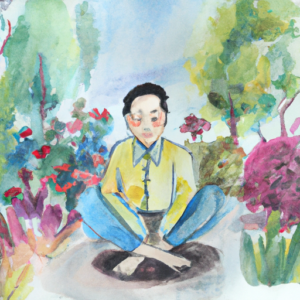In our fast-paced, technology-driven world, finding moments of peace and tranquility can be a challenge. It is in this context that the concept of pleine conscience has gained immense popularity. But what exactly is pleine conscience? In this article, we will delve into the comprehensive definition of pleine conscience and explore its numerous benefits. We will also examine the core elements of pleine conscience, including the techniques and practices that can help cultivate a mindful state of being. Additionally, we will dive into the science behind pleine conscience, uncovering the psychological and physiological effects it has on the human mind and body. Whether you are a beginner looking to understand pleine conscience or a seasoned practitioner seeking a deeper understanding, this article will provide valuable insights into the transformative power of pleine conscience. So, let’s embark on this journey of self-awareness and explore the world of pleine conscience together.
- 1) "Comprendre la pleine conscience : une définition complète et ses avantages".
- 2) "Exploration des éléments fondamentaux de la pleine conscience : techniques et pratiques".
- The Science Behind Mindfulness : Examining the Psychological and Physiological Effects" (La science derrière la pleine conscience : examen des effets psychologiques et physiologiques).
1. "Understanding La pleine conscience: A Comprehensive Definition and Its Benefits"

Understanding La pleine conscience: A Comprehensive Definition and Its Benefits
La pleine conscience, in its essence, refers to the practice of purposely bringing one’s attention to the present moment without judgment. It involves cultivating a state of heightened awareness and being fully engaged in the present experience, whether it be thoughts, emotions, sensations, or surroundings. La pleine conscience encourages individuals to observe their thoughts and feelings objectively, acknowledging them without getting caught up in their content or reacting impulsively.
Cette pratique trouve son origine dans les anciennes traditions bouddhistes, mais elle a été adaptée et intégrée à la psychologie contemporaine et aux pratiques de bien-être. Elle a gagné en reconnaissance et en popularité grâce à ses nombreux bienfaits pour le bien-être mental, émotionnel et physique.
One of the primary benefits of pleine conscience is its ability to reduce stress and promote relaxation. By consciously focusing on the present moment, individuals can detach themselves from worries about the past or future, allowing them to experience a sense of calmness and tranquility. This practice has been scientifically proven to lower levels of the stress hormone cortisol, leading to improved overall health and a strengthened immune system.
Furthermore, pleine conscience can enhance emotional well-being by increasing self-awareness and emotional intelligence. When individuals practice pleine conscience, they become more attuned to their emotions and can better regulate them. This awareness allows for a more thoughtful and considered response to challenging situations, reducing the likelihood of impulsive or reactive behavior. As a result, individuals may experience improved relationships, increased empathy, and a greater sense of overall emotional resilience.
Additionally, pleine conscience has shown promising results in improving cognitive abilities and concentration. By training the mind to focus on the present moment, individuals can enhance their attention span and concentration levels. This can be particularly beneficial in academic or professional settings, where sustained focus is often required. Moreover, studies have indicated that pleine conscience practice can enhance creativity and problem-solving skills by encouraging individuals to think more flexibly and open-mindedly.
Lastly, pleine conscience has been found to have positive effects on physical health. Regular practice has been associated with reduced blood pressure, improved sleep quality, and enhanced overall physical well-being. This is likely due to the mind-body connection, as pleine conscience helps individuals develop a greater awareness of their bodily sensations and needs, leading to healthier lifestyle choices.
In conclusion, pleine conscience can be defined as the intentional practice of being fully present in the moment, without judgment. Its benefits range from stress reduction and emotional well-being to improved cognitive abilities and physical health. By incorporating pleine conscience into our daily lives, we can cultivate a greater sense of self-awareness and lead a more balanced and fulfilling life.
2. "Exploring the Core Elements of La pleine conscience: Techniques and Practices"

Exploring the Core Elements of La pleine conscience: Techniques and Practices
La pleine conscience is a practice that involves paying attention to the present moment with non-judgmental awareness. It is about being fully engaged in the here and now, without being consumed by thoughts of the past or worries about the future. The practice of pleine conscience has gained significant popularity in recent years, as individuals search for ways to reduce stress and enhance their overall well-being.
Techniques and practices play a crucial role in cultivating pleine conscience. These methods act as tools to help individuals develop and strengthen their ability to be fully present in the moment. While there are various techniques and practices available, they all share a common aim – to promote a state of pleine conscience.
One of the fundamental techniques in pleine conscience practice is focused attention. This involves choosing an object of focus, such as the breath, and directing attention solely to that object. By anchoring attention to the breath, individuals can train their minds to stay present and prevent them from getting caught up in distractions or wandering thoughts.
Une autre technique clé est la méditation par balayage du corps. Cette pratique consiste à porter systématiquement son attention sur différentes parties du corps, en commençant par les orteils et en remontant vers le haut. Les personnes sont encouragées à observer toute sensation, tension ou gêne sans porter de jugement. Le balayage du corps aide à cultiver la conscience des sensations corporelles et favorise une connexion plus profonde entre l'esprit et le corps.
Mindful walking is another popular technique that combines physical movement with pleine conscience. During mindful walking, individuals focus their attention on the sensations of walking, such as the feeling of the ground beneath their feet or the movements of their legs. This practice allows individuals to engage with their surroundings and experience the act of walking in a more intentional way.
In addition to these techniques, pleine conscience practices also include meditation, mindful eating, and mindful listening. Meditation involves sitting quietly and observing the breath or bodily sensations, while mindful eating encourages individuals to eat slowly and savor each bite, paying attention to the taste, texture, and smell of the food. Mindful listening involves giving full attention to the sounds and words of others, without interrupting or being preoccupied with one’s own thoughts.
By incorporating these techniques and practices into daily life, individuals can develop the skill of pleine conscience and experience its many benefits. La pleine conscience allows individuals to cultivate a greater sense of calm, reduce stress, improve focus, and enhance overall well-being. Through consistent practice, individuals can integrate pleine conscience into their everyday activities, leading to a more present and fulfilling life.
3. "The Science Behind La pleine conscience: Examining the Psychological and Physiological Effects"

The science behind pleine conscience is a fascinating and rapidly growing field of study that delves into the psychological and physiological effects of practicing pleine conscience. La pleine conscience can be defined as the practice of bringing one’s attention to the present moment, without judgment or attachment to thoughts, emotions, or sensations.
Numerous scientific studies have been conducted to explore the impact of pleine conscience on mental and physical well-being. From a psychological perspective, pleine conscience has been found to reduce stress, anxiety, and depression. By cultivating a non-judgmental awareness of one’s thoughts and feelings, individuals can develop a sense of emotional resilience and better cope with challenging situations.
In terms of physiological effects, pleine conscience has been shown to have a positive impact on the brain and the body. Neuroscientists have discovered that regular pleine conscience practice can lead to changes in the structure and function of the brain. For example, studies using brain imaging techniques such as MRI have revealed that pleine conscience meditation increases the thickness of the prefrontal cortex, a region associated with attention and emotional regulation.
Furthermore, pleine conscience has been found to activate the body’s relaxation response, leading to reduced heart rate, blood pressure, and cortisol levels – the hormone associated with stress. This can have significant implications for individuals with chronic health conditions, as pleine conscience has been shown to improve symptoms and overall quality of life.
Additionally, research has demonstrated that pleine conscience can enhance cognitive abilities such as attention, memory, and decision-making. By training the mind to focus on the present moment, individuals can enhance their ability to concentrate and sustain attention, leading to improved performance in various tasks.
Overall, the scientific evidence supporting the psychological and physiological effects of pleine conscience is substantial and continues to grow. As pleine conscience gains popularity as a therapeutic approach, more research is being conducted to explore its potential benefits and mechanisms of action. Understanding the science behind pleine conscience not only validates its effectiveness but also provides insights into how we can harness its power to improve our mental and physical well-being.
In conclusion, pleine conscience can be defined as a state of present moment awareness and acceptance, characterized by non-judgmental and non-reactive attention to one’s thoughts, feelings, and sensations. This comprehensive definition encompasses the core elements of pleine conscience, which include techniques and practices such as meditation, breathing exercises, and body scans. The benefits of pleine conscience are vast, ranging from reducing stress and anxiety to improving focus and overall well-being. The science behind pleine conscience supports its effectiveness, with numerous studies demonstrating its positive psychological and physiological effects. As more research is conducted and pleine conscience continues to gain popularity, it is evident that incorporating pleine conscience into our daily lives can have profound and lasting impacts on our mental and physical health. Embracing pleine conscience as a way of life can lead to greater self-awareness, increased resilience, and a deeper sense of connection to ourselves and the world around us.




